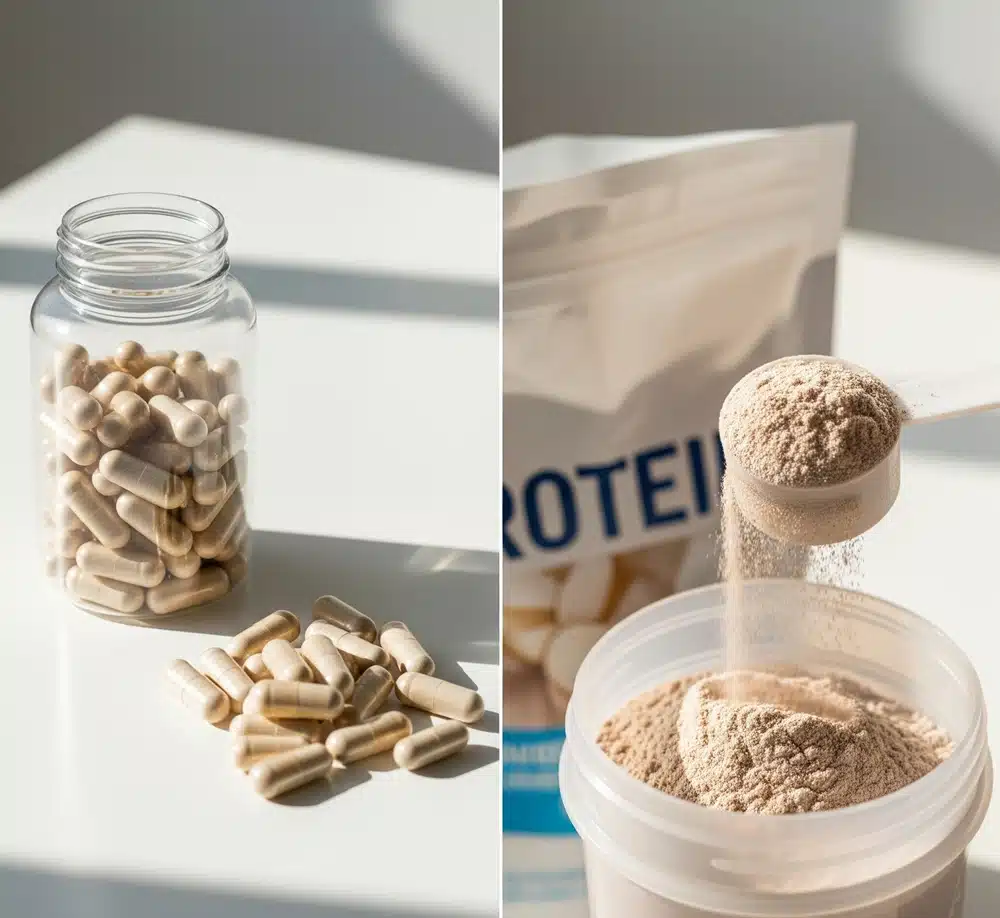
Sie haben gerade ein hartes Training hinter sich und Ihre Muskeln schreien nach einer schnellen Proteinlösung, um die Regeneration zu beschleunigen. Du greifst zu deiner Sporttasche, aber die Wahl ist nicht mehr so einfach wie früher. Greifen Sie zur bewährten Shaker-Flasche und einem Löffel Proteinpulver oder zur schlanken, praktischen Einfachheit von Proteinkapseln?
Das ist nicht nur eine Frage der Vorliebe; es geht darum, das richtige Mittel für Ihren Lebensstil und Ihre Fitnessziele zu finden. In diesem Leitfaden gehen wir auf alles ein, was Sie wissen müssen, und vergleichen Proteinkapseln und -pulver hinsichtlich der wichtigsten Faktoren: Bequemlichkeit, Kosten, Dosierung und Absorption. Am Ende werden Sie genau wissen, welche Option die richtige für Sie ist.
Was sind Eiweißkapseln?
Proteinkapseln sind die ultimative Lösung zum Mitnehmen. Es handelt sich einfach um vorgemessene Dosen von Proteinpulver - oft Molke, Kollagen oder eine pflanzliche Mischung - in einer verdaulichen Gelatine- oder vegetarischen Hülle. Der primäre Reiz liegt in ihrer schieren Bequemlichkeit.
Vorteile:
- Ultimative Bequemlichkeit: Kein Mischen, kein Durcheinander. Einfach mit Wasser schlucken.
- Geschmacklos: Ideal für alle, die den Geschmack oder die Konsistenz von Proteinshakes nicht mögen.
- Genaue Dosierung: Jede Kapsel enthält eine bestimmte, abgemessene Menge an Eiweiß, so dass man bei der Nahrungsergänzung nicht mehr raten muss.
- Reisetauglich: Leicht in einer Tasche, im Auto oder in der Hosentasche zu transportieren, ohne dass man sich Sorgen um verschüttete Flüssigkeiten machen muss.
Eine Beraterin, die wöchentlich verreist, findet es unmöglich, einen sperrigen Becher mit Proteinpulver einzupacken. Stattdessen bewahrt sie eine kleine Flasche mit Proteinkapseln in ihrem Handgepäck auf. Sie kann sie im Flugzeug oder in ihrem Hotelzimmer mit einem einfachen Glas Wasser einnehmen und verfehlt nie ihr Proteinziel. Für sie überwiegt die absolute Bequemlichkeit alles andere.
Nachteile:
- Weniger Eiweiß pro Portion: Möglicherweise müssen Sie mehrere Kapseln einnehmen, um den Proteingehalt eines einzigen Messbechers Pulver zu erreichen.
- Potenziell höhere Kosten: Auf einer Gramm-für-Gramm-Basis sind Kapseln oft teurer als loses Pulver.
- Langsamere Absorption: Die Hülle muss sich auflösen, bevor das Protein aufgenommen werden kann, was etwas langsamer als bei einem vorgemischten Shake sein kann.
Ein Bodybuilder, der unmittelbar nach einem schweren Krafttraining 30 Gramm Eiweiß zu sich nehmen möchte, würde Kapseln unpraktisch finden. Um sein Ziel zu erreichen, müsste er möglicherweise mehr als 30 Kapseln schlucken, was im Vergleich zum Trinken eines schnell absorbierenden Proteinshakes umständlich und langsam ist.
Was ist Proteinpulver?
Eiweißpulver ist die klassische Ergänzung für Muskelwachstum und Erholung. Es ist eine dehydrierte Proteinquelle - meist aus Molke, Kasein, Soja oder Erbsen - die zu einem losen Pulver gemahlen wird. Es wird mit einer Flüssigkeit wie Wasser oder Milch gemischt, um einen Proteinshake herzustellen.
Vorteile:
- Hoher Eiweißgehalt pro Portion: Es ist einfach, 20-30 Gramm Protein in einem einzigen Messlöffel zu erhalten.
- Kostengünstig: Auf einer Pro-Gramm-Basis ist loses Pulver fast immer billiger als Kapseln.
- Schnelle Absorption: Vor allem Molkenprotein wird sehr schnell verdaut und ist daher ideal für die Erholung nach dem Training.
- Vielseitig: Kann für die Zubereitung von Shakes und Smoothies verwendet oder sogar Lebensmitteln wie Haferflocken und Backwaren zugesetzt werden.
Ein Gewichtheber, der ein schweres Beintraining absolviert, muss seine Muskeln schnell wieder auffüllen. Indem er einen einzigen Messlöffel Molkepulver mit Wasser mischt, nimmt er sofort 25 Gramm schnell resorbierbares Protein zu sich, um seine Regeneration zu maximieren - eine Dosis, die in diesem Zeitrahmen mit Kapseln nicht zu erreichen wäre.
Nachteile:
- Erfordert Vorbereitung: Sie brauchen eine Shakerflasche oder einen Mixer, um es richtig zu mischen.
- Kann chaotisch sein: Das Schöpfen und Mischen von Pulver kann manchmal zu Verschüttungen und einer staubigen Säuberung führen.
- Probleme mit dem Geschmack/der Konsistenz: Manche Menschen mögen den Geschmack oder die Beschaffenheit bestimmter Proteinpulver nicht.
Ein Pendler, der es eilig hat, aus der Tür zu kommen, versucht, schnell einen Shake zu mixen. Das Pulver löst sich nicht vollständig auf, so dass Klumpen zurückbleiben, und ein Hauch von Pulver entweicht aus dem Behälter auf die dunkle Arbeitskleidung. Die Notwendigkeit der Zubereitung und die mögliche Unordnung bedeuten zusätzlichen Stress für den Morgen.
Der Kopf-an-Kopf-Vergleich: 5 Hauptunterschiede
| Merkmal | Protein-Kapseln | Protein-Pulver |
|---|---|---|
| Bequemlichkeit | ✅ Der Gewinner: Kein Mischen oder Aufräumen erforderlich. Perfekt für Reisen und volle Terminkalender. | Erfordert eine Schüttelflasche und Flüssigkeit. Kann unordentlich sein. |
| Dosierung | Feste Dosis pro Kapsel (z.B. 0,5-1g). Unflexibel bei hohem Eiweißbedarf. | ✅ Der Gewinner: Vollständig anpassbar. Einfaches Anpassen der Messlöffelgröße für spezifische Proteinziele. |
| Absorptionsgeschwindigkeit | Etwas langsamer, da sich die Kapsel erst im Magen auflösen muss. | ✅ Der Gewinner: Sehr schnell, vor allem Molkenprotein, wodurch es ideal für die Erholung nach dem Training ist. |
| Kosten pro Gramm | Aufgrund des Herstellungsverfahrens in der Regel teurer. | ✅ Der Gewinner: Das ist viel kostengünstiger, vor allem wenn man in großen Mengen kauft. |
| Geschmack und Vielseitigkeit | Geschmacks- und geruchsneutral, kann aber nicht in Rezepten verwendet werden. | ✅ Der Gewinner: Es ist in vielen Geschmacksrichtungen erhältlich und kann in Smoothies, Haferflocken und zum Backen verwendet werden. |
Wer sollte sich für Eiweißkapseln entscheiden?
Auch wenn das Pulver in einigen Kategorien die Nase vorn hat, sind Proteinkapseln die ideale Lösung für bestimmte Lebensstile, bei denen Bequemlichkeit der unbestrittene Sieger ist. Hier ist, wer am meisten profitiert:
- Der Brand Builder: Für Unternehmer, die in den Markt einsteigen wollen, bieten Kapseln einzigartige Möglichkeiten. Die Zusammenarbeit mit einem Unternehmen, das Dienstleistungen wie Private Label Supplements oder Individuelle Formulierung von Ergänzungsmitteln ermöglicht es Ihnen, ein zielgerichtetes Produkt für ein Nischenpublikum zu entwickeln, das Präzision und Benutzerfreundlichkeit schätzt.
- Der vielbeschäftigte Berufstätige oder Vielreisende: Für diejenigen, die ständig unterwegs sind, kann der Wert einer praktischen Darreichungsform gar nicht hoch genug eingeschätzt werden. Verkapselte Nahrungsergänzungsmittel können in eine Aktentasche oder ein Handgepäck gesteckt werden, ohne die Unordnung oder den Ärger von Pulvern, so dass Sie Ihre Routine überall auf der Welt beibehalten können.
- Die Person, die Shakes nicht mag: Viele Menschen reagieren empfindlich auf den Geschmack, die Konsistenz oder die Süßstoffe in Proteinpulvern. Kapseln bieten eine vollkommen geschmacks- und geruchsneutrale Alternative. Bei der Auswahl eines Produkts ist es ratsam, nach einer Marke zu suchen, die mit einem erstklassigen Hersteller von Nahrungsergänzungsmitteln in Kapselform um sicherzustellen, dass sie hochwertige Zutaten verwenden.
Wer sollte Proteinpulver wählen?
Proteinpulver ist nicht ohne Grund der Industriestandard. Es bietet eine leistungsstarke Kombination aus Wert, Flexibilität und Leistung, die nur schwer zu übertreffen ist. Es ist die erste Wahl für:
- Der kreative Koch: Proteinpulver ist nicht nur für Shakes geeignet. Seine Vielseitigkeit zeigt sich in der Küche, wo es in Fruchtsmoothies gemixt, in Haferflocken für ein sättigendes Frühstück gemischt oder sogar als Mehlersatz in Rezepten für gesunde Pfannkuchen und Muffins verwendet werden kann.
- Der Sportler oder Bodybuilder: Nach einem anstrengenden Training brauchen die Muskeln eine hohe Dosis schnell absorbierbarer Proteine, um sich zu regenerieren und zu wachsen. Ein einziger Messlöffel Molkenproteinpulver liefert 20-30 Gramm Protein weitaus effizienter als das Schlucken von Dutzenden von Kapseln, was es zum unangefochtenen Champion für ernsthafte Erholung macht.
- Der budgetbewusste Verbraucher: Wenn es um die Kosten pro Gramm Eiweiß geht, ist Pulver der klare Sieger. Für jeden, vom Studenten bis zur Familie, die versucht, ihre Lebensmittelrechnungen in den Griff zu bekommen, ist der Kauf von Eiweiß in einem großen Becher die wirtschaftlichste Art, ihre Ernährung zu ergänzen.
Schlussfolgerung: Die richtige Wahl ist eine persönliche Entscheidung
Letztendlich geht es bei der Debatte zwischen Proteinkapseln und -pulver nicht darum, eine einzige “beste” Option zu finden - es geht darum, die beste Option für Sie zu finden.
Wenn Ihr Leben von einem vollen Terminkalender, ständigem Reisen und dem Bedürfnis nach ultimativem Komfort bestimmt wird, ist die Einfachheit von Proteinkapseln die perfekte Lösung. Wenn Ihre Prioritäten jedoch darin liegen, die Proteinzufuhr zu maximieren, die Kosten niedrig zu halten und die Flexibilität zu haben, in der Küche kreativ zu werden, dann ist traditionelles Proteinpulver nach wie vor Ihre beste Wahl.
Indem Sie die Faktoren Bequemlichkeit, Kosten, Dosierung und Vielseitigkeit mit Ihrem eigenen Lebensstil und Ihren Fitnesszielen abwägen, können Sie getrost die Wahl treffen, die Ihre Reise am besten unterstützt.
referenziert
- National Institutes of Health (NIH) - Nahrungsergänzungsmittel für Sport und sportliche Leistung https://ods.od.nih.gov/factsheets/ExerciseAndAthleticPerformance-HealthProfessional/
- Zeitschrift der Internationalen Gesellschaft für Sporternährung - “Protein and Exercise”-Standpunkt https://jissn.biomedcentral.com/articles/10.1186/s12970-017-0177-8
- U.S. Food & Drug Administration (FDA) - Informationen für Verbraucher zur Verwendung von Nahrungsergänzungsmitteln https://www.fda.gov/food/dietary-supplements/information-consumers-using-dietary-supplements

